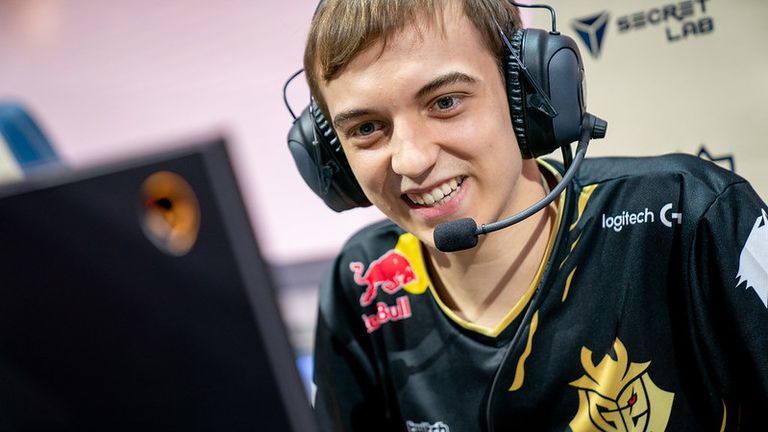What is Champions Queue?
Champions Queue is a private matchmaking system for top League of Legends players. Think of it as a more serious version of ranked games, built specifically for pro play. It’s invite-only and was made to give players better practice matches with low ping, mandatory voice comms, and no trolls.
It’s mostly made up of LCS pros, Academy players, and high-ranking amateur players. Riot launched it in 2022 to give North American pros a better way to practice outside of official scrims.
Right now, it’s getting a lot of attention because more players are streaming their matches, fans are tracking the leaderboard, and it’s helping pros get meaningful practice, especially as the LCS and Worlds seasons heat up.
How Champions Queue Works
Champions Queue runs through a private Discord server. Everyone invited gets access to this space, and a matchmaking bot helps form games by pairing 10 players into two teams. Once matched, players jump into a custom game and play just like a normal ranked match—except it’s way more structured.
Voice comms are mandatory, and so are clean records. Things like trolling, going AFK or wintrading are grounds to be expelled from the space permanently.

Matchmaking and MMR
The CQ Council introduced an internal MMR system just for Champions Queue. It works behind the scenes to match players of similar skill levels. So even though there’s a leaderboard, players aren’t just grinding LP like in solo queue. The focus is on quality games.
Server Details
Matches take place on a dedicated server in Los Angeles. That’s important because the main League servers for NA are in Chicago. Most pros live and play from LA, which means they normally deal with higher ping. Champions Queue solves that with low-latency games that feel smoother and more responsive.
Access Requirements
Only LCS pros, Academy players, LLA players, and top amateur players can join. You need to meet a rank threshold (usually Grandmaster or Challenger) depending on the season, along with having a clean behavior record. The CQ Council can still veto applicants for other reasons.
The system is tight by design. Riot wants it to be a high-quality environment for practice, not for farming content or clout.
Champions Queue vs Solo Queue
Solo queue is the standard ranked ladder that anyone can climb. It’s huge, unpredictable, and full of different player types. Some are trying hard, others are just messing around. Voice chat doesn’t exist, and games can often get frustrating, especially at high ranks where coordination really matters.
Champions Queue, on the other hand, is focused on serious play. Most variables are controlled to be closer to pro-play match. Games can't get too heated, everybody must play to the best of their ability, and one-tricks aren't allowed.
For pros, the difference is massive. Solo queue just doesn’t offer the structure or environment they need. Without time and space to develop their own strategies, the pro-play meta can become a stagnant, stillwater environment where the same picks are played year after year.
CQ offers pro-players a place where they can experiment, without costing their team hundreds of thousands of dollars in prize money.
Finally, whereas normal ranked queues allow you to duo with a friend with some restrictions, CQ only allows solo-queue.
Who Can Join Champions Queue?

Not everyone can hop into Champions Queue. It’s a private system, and the CQ Council controls who gets in.
Here’s who’s eligible:
- Current LCS and Academy players
- LLA players (from Latin America’s pro league)
- Top 16 NA amateur teams from Proving Grounds qualifiers
- Recent LCS alumni (former pros)
- Challenger-level solo queue players, but only if they apply and get approved
And starting from one of the recent seasons,
amateur players need to have hit Challenger at least once to keep their spot. Just being Grandmaster isn’t enough anymore.
If you're aiming to qualify for Champions Queue, climbing to Challenger is mandatory for amateur players. If you're starting fresh or want to optimize your grind, consider using a ranked-ready smurf account to skip early elo and focus on high-level improvement.
Behavior Rules
Everyone has to pass a behavior check. If someone flames, trolls, or intentionally feeds, they can be kicked off from the community—no questions asked. The queue is monitored by a council made up of pro players, team staff, and Riot employees.
Expanded Access for Worlds
For Champions Queue Worlds (the special queue during the World Championship), Riot expanded access a bit. Now, former pro players from major regions (like LEC, LCK, or LPL) and ex-Academy players can join, if they:
- Hit Challenger in solo queue this season
- Are based in North America
- Get approved by the CQ Council
It’s still strict, but the Council opened the door a little wider during Worlds to make games better and more competitive.
Champions Queue Leaderboard and Tracker
Riot keeps a live leaderboard that tracks every match within the queue. Players earn points based on their performance, and at the end of each season, the top scorers get real prizes.

Where to Track It
All matches are logged through Riot’s API, and you can view the full leaderboard here. Riot hosts the official tracker, and fans follow it closely—especially when big names are climbing the ranks.
Here’s what’s cool about the leaderboard:
- It updates in real time
- You can see who's on a win streak
- You can dig into each match’s team comps and results
Prize Pool
Champions Queue has a $400,000 prize pool spread across the year. Each season (Spring and Summer) has three splits. Players earn points each split, and at the end of the season, the best ones cash out.
Top five players by total points can earn:
- 1st: $62,200
- 2nd: $52,000
- 3rd: $49,400
- 4th: $43,700
- 5th: $39,700
Why Riot Introduced Champions Queue
Riot built Champions Queue because solo queue just wasn’t cutting it for pro players—especially in North America. Korean players can usually access the Chinese super-server, but some have described it as "solo-queue on steroids". If we see CQ succeed, it's likely we'll start seeing it in other regions, such as China, Korea and Europe.
The Ping Problem
The NA live servers are in Chicago, but most pro teams are based in Los Angeles. That means every solo queue match they play has at least 50 ping. Not ideal when milliseconds matter. While pro teams could instead practice in Chicago, this adds an unnecessary pay-to-win layer.
Champions Queue runs on a
server in LA, giving players super low ping and smoother gameplay. That alone makes a huge difference for practice.
Inspired by China’s Super Server
Riot took notes from China’s “super server,” which only allows high-rank players and keeps matches clean. Champions Queue follows that model, but adds voice and prize incentives.
In short: Riot made Champions Queue to give NA pros a place to train like they’re on stage. And based on feedback, most of them love it.
Pros and Cons of Champions Queue

Pros
+ Low Ping for LA Players
Because the server is in Los Angeles, players finally get smooth, low-latency games, way better than the 50+ ping they get on the Chicago server.
+ High-Quality Matches
Every player is either a pro or a vetted amateur. Everybody's playing to compete and win, which saves time for everybody involved.
+ Mandatory Voice Comms
CQ requires you to use voice comms when playing, which makes for a clearer experience. Games have also been demonstrated to be less likely to get heated when everybody can hear each other over voice.
+ Incentivized
A significant prize pool and live leaderboard mean that there's still a very strong incentive to try your very best, even if it's not actual pro-play.
+ Strong Moderation
Toxic players can—and do—get kicked. The community council watches behavior closely, so the environment stays clean and focused. Riot Games is committed to keeping CQ as pragmatic and useful for pros possible, not an environment to farm Twitch viewers.
Cons
- Centralized and Tightly Controlled
Most players can’t get in. Even top-tier solo queue players need to be invited to apply and get approved. This keeps quality high, but many people disagree with the CQ Council's calls.
- Queue Times Can Be Long
Because the pool is small and tightly controlled, players sometimes wait a while for games, especially during off-hours or low activity periods, with queue times being even longer than in high elo.
- Still Needs Tweaks
Some players have said game quality can be inconsistent. Riot has been adjusting rank requirements and reviewing access more closely to fix that, but it's inconsistent enough that some invited players choose not to apply.
FAQs
What is Champions Queue in League of Legends?
Champions Queue is a private, invite-only ranked system made for pro and top-level amateur players. It’s designed to give pro players a better environment to practice with low ping.
How Does Champions Queue Work?
Players are invited to a private Discord server where a bot forms matches. Once 10 players are matched, they jump into a custom game on a dedicated low-ping server in Los Angeles. Most players use voice chat during games which makes the experience the closest it can be to real team scrims, without inviting everybody over to the same building for a LAN party.
Who Can Play in Champions Queue?
You need to be part of one of these groups:
- Current LCS or Academy players
- LLA pros
- Top amateur players from NA
- Recent LCS pros
- High-ranking solo queue players (usually Grandmaster+)
You also have to pass a behavior check, and Riot can remove players for toxicity. Generally, players are invited to apply, rather than straight up allowed to apply if they're within a given bracket.
What's the Difference Between Champions Queue and Solo Queue?
Champions Queue uses a discord bot for matchmaking people into a custom game.
Solo queue is open to everyone and often chaotic. Champions Queue is tightly moderated, invite-only, and focused on serious gameplay. It has voice comms, lower ping for LA-based players, and better match quality.
How do I access Champions Queue?
If you're eligible, Riot or the CQ Council can invite you. High-ranking players (like Challenger) can apply, but they must also meet location and behavior standards. During Worlds, access expands slightly to include more ex-pros.
Is Champions Queue Only for Pro Players?
Mostly, yes—but not entirely. While it’s aimed at pros, some top amateur and solo queue players can join if they meet the requirements and are approved.
When Was Champions Queue Introduced?
Riot launched Champions Queue in February 2022 to give North American pros a better way to practice outside of regular scrims.
What is the Leaderboard System in Champions Queue?
Every match is tracked and logged. Players earn points each split, and the top performers are ranked on a live leaderboard. At the end of the season, there’s a $400,000 prize pool split among the top players.
Why Did Riot Create Champions Queue?
Riot made Champions Queue because NA pros were struggling with solo queue. The main servers are based in Chicago, which means high ping for players in LA. Solo queue also lacked coordination and quality. CQ fixes that with a low-ping server, voice chat, and a vetted player pool.
How Are Players Matched in Champions Queue?
Champions Queue uses an internal MMR system to match players with similar skill levels. A Discord bot helps arrange matches, and players are slotted into custom games once teams are ready.


